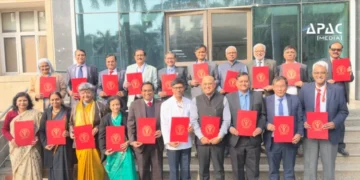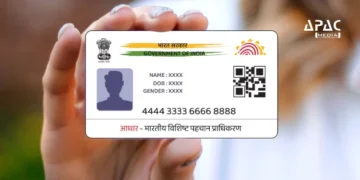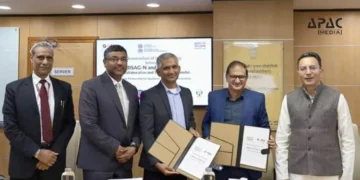Chennai: At the APAC 7th Health Tech Innovation Conclave, Chennai, key speaker Dr. G. Jerard Maria Selvam, the Additional Director, National Health Mission, Tamil Nadu talked about the pivotal role of innovation and technology in reshaping healthcare delivery, citing the ongoing transformation driven by rapid technological advancements.
“Healthcare delivery is undergoing a significant transformation, driven by rapid technological advancements,” Selvam said.
Addressing the challenges embedded in the current healthcare system, Dr. Selvam stressed the need to tackle issues like accessibility and the financial burden on patients, and gave his insight on the importance of embracing new solutions to enhance healthcare and urged a focus on preventive and primary care with increased investments in these areas.
The purpose of innovation and technology
“We need to always embrace new solutions and improve upon it in order to transform healthcare,” Selvam said.
Enhance accessibility:
Technology can bridge geographical gaps, connecting patients with healthcare providers remotely. Telemedicine, for instance, expands access to care. Eg. Tamil Nadu has implemented e-Sanjeevani Tele-consultation services at HWC-HSCs.
Reduce costs:
Efficiency gains through technology, preventive care, and remote monitoring can help contain costs and make healthcare more affordable.
Improving data management:
Electronic Health Records (EHRs) ensure secure, interoperable data management while protecting patient privacy.
Healthcare Delivery in Tamil Nadu
With the aim of creating a well-developed Public Health Infrastructure, including Primary Health Centres, Government Hospitals, and Medical College Hospitals that provide accessible and affordable healthcare services, the Tamil Nadu government implemented several drives.
Innovative healthcare programs and technology-driven initiatives, such as the Health Management Information System (HMIS) and Population Health Registry (PHR), contribute to improved healthcare outcomes. “You have to prioritise preventive and primary care if you want to run any health system,” Selvam said, adding that it is important to make more investments in this area.
Health Management System Modules
Dr. Selvam outlined the various modules of a Health Management System, including Patient Information Management, Appointment Scheduling, Electronic Health Records (EHR), Billing and Invoicing, Prescription and Pharmacy Management, Laboratory Information System (LIS), Human Resources Management, Finance and Budgeting, Telehealth and Remote Monitoring, Analytics and Reporting, and Security and Access Control.
Management Information System (MIS) in Healthcare
Dr Selvam also talked about how MIS plays a crucial role in streamlining healthcare management, centralising patient information, automating appointment scheduling, and facilitating EHR for comprehensive data management, emphasising on how it supports decision-making through analytics, enhances financial management, and ensures security and privacy compliance.
Innovative Healthcare Initiatives in Tamil Nadu
Dr Selvam briefly touched upon the Pregnancy and Infant Cohort Monitoring and Evaluation (PICME) system, which tracks pregnant women, providing financial assistance and essential health services.
The Tamil Nadu government implemented the Pregnancy and Infant Cohort Monitoring and Evaluation (PICME) system to monitor all pregnant women, providing them with a 12-digit RCH ID.
This unique identifier facilitates comprehensive tracking of various aspects of the pregnancy by the Public Health Department. Under the PICME scheme, expectant mothers receive financial assistance of up to Rs. 12,000.
The first instalment of Rs. 4000 is granted during the 7th month of pregnancy to cover essential health services. Following delivery in Government or Local Body Institutions, the second instalment of Rs. 4000 is provided. The third instalment, also Rs. 4000, is given to mothers upon completion of the third dose of DPT, Hepatitis, and Polio vaccines for the child.
He also talked about the benefits that the people of Tamil Nadu received through the Makkalai Thedi Maruthuvam Scheme. The Tamil Nadu government initiated this scheme with the aim of reducing the influx of patients seeking treatment for non-communicable diseases at various hospitals. This program ensures that healthcare is brought directly to the doorsteps of the state’s residents. The doorstep healthcare initiative is currently accessible in seven districts, encompassing key areas such as Chennai and Coimbatore.
Only through continued investments in technology and a proactive approach to challenges will the healthcare landscape see positive change, setting a precedent for a more inclusive and patient-centric healthcare delivery system.













































Discussion about this post